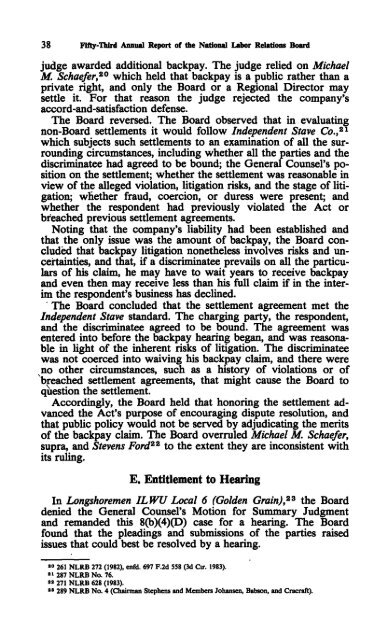Operations In Fiscal Year 1988 - National Labor Relations Board
Operations In Fiscal Year 1988 - National Labor Relations Board
Operations In Fiscal Year 1988 - National Labor Relations Board
You also want an ePaper? Increase the reach of your titles
YUMPU automatically turns print PDFs into web optimized ePapers that Google loves.
38 Fffty-Third Annual Report of the <strong>National</strong> <strong>Labor</strong> <strong>Relations</strong> <strong>Board</strong>judge awarded additional backpay. The judge relied on MichaelM. Schaefer, 2° which held that backpay is a public rather than aprivate right, and only the <strong>Board</strong> or a Regional Director maysettle it. For that reason the judge rejected the company'saccord-and-satisfaction defense.The <strong>Board</strong> reversed. The <strong>Board</strong> observed that in evaluatingnon-<strong>Board</strong> settlements it would follow <strong>In</strong>dependent Stave Co.,21which subjects such settlements to an examination of all the surroundingcircumstances, including whether all the parties and thediscriminatee had agreed to be bound; the General Counsel's positionon the settlement; whether the settlement was reasonable inview of the alleged violation, litigation risks, and the stage of litigation;whether fraud, coercion, or duress were present; andwhether the respondent had previously violated the Act orbreached previous settlement agreements.Noting that the company's liability had been established andthat the only issue was the amount of backpay, the <strong>Board</strong> concludedthat backpay litigation nonetheless involves risks and uncertainties,and that, if a discriminatee prevails on all the particularsof his claim, he may have to wait years to receive backpayand even then may receive less than his full claim if in the interimthe respondent's business has declined.' The <strong>Board</strong> concluded that the settlement agreement met the<strong>In</strong>dependent Stave standard. The charging party, the respondent,and the discriminatee agreed to be bound. The agreement wasentered into before the backpay hearing began, and was reasonablein light of the inherent risks of litigation. The discriminateewas not coerced into waiving his backpay claim, and there wereno other circumstances, such as a history of violations or ofbreached settlement agreements, that might cause the <strong>Board</strong> toqUestion the settlement.Accordingly, the <strong>Board</strong> held that honoring the settlement advancedthe Act's purpose of encouraging dispute resolution, andthat public policy would not be served by adjudicating the meritsof the backpay claim. The <strong>Board</strong> overruled Michael M Schaefer,supra, and Stevens Ford22 to the extent they are inconsistent withits ruling.E. Entitlement to Hearing<strong>In</strong> Longshoremen ILWU Local 6 (Golden Grain), 23 the <strong>Board</strong>denied the General Counsel's Motion for Summary Judgmentand remanded this 8(b)(4)(D) case for a hearing. The <strong>Board</strong>found that the pleadings and submissions of the parties raisedissues that could best be resolved by a hearing.22 261 NLRB 272 (1982), enfd. 697 F.2d 558 (3d Cir. 1983).21 287 NLRB No. 76.22 271 NLRB 628 (1983).22 289 NLRB No. 4 (Chairman Stephens and Members Johansen, Babson, and Craeraft).
















